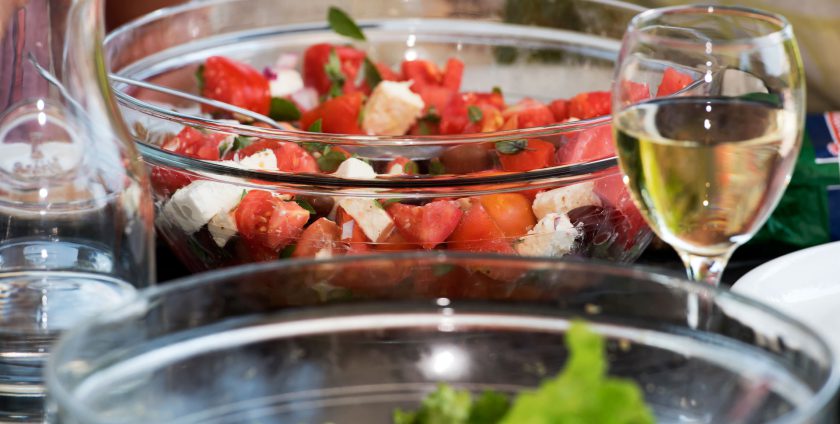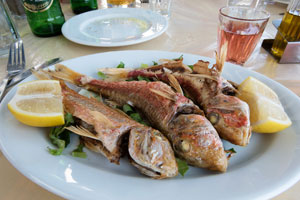Eat, live and love Mediterranean

I fell in love with Mediterranean food about 11 years ago in a place on the east coast of Sicily called Taormina – a hill top town lying between the sea and the foothills of Etna. Amongst the idyllic side streets, we found a locally-acclaimed restaurant. I proceeded to experience a quite divine plate of parmigiana. It was simple, light, perfectly prepared, full of flavour, and with plenty of olive oil – genuinely mind-blowing and truly Mediterranean.

There seemed to be such a high standard of food everywhere I went here, with ingredients almost always fresh and locally-produced. Then a 21 year old 14 stone Brit on tour, I may well have gorged myself in the infinite amount of charming restaurants and trattorias.
After some locally-produced wine and limoncello, however, I pondered the Italian national football team capturing their fourth World Cup win that summer in 2006. Relentless “I’m on holiday” eating and drinking – something we’ve all done – wouldn’t be very “Mediterranean” of me. And clearly these guys know what they’re doing!
Healthy and delicious
The world may have adopted pizza, pasta and prosecco. But when people refer to eating Mediterranean, a lot of us don’t realise it is not about alcohol and complex carbohydrates.

The diet is healthy (and delicious) as it typically features the following:
- Olive oil
- Lovingly harvested and prepared fruits & vegetables without the air miles
- Fresh fish and seafood
- Dishes delicately enhanced with herbs and spices and not packed with salt, sugar and fat
- Plenty of nuts, seeds, legumes, beans and whole-grains
- Alcohol and dairy that is high in quality, but moderate in consumption
And perhaps more important to health, is the Mediterranean lifestyle and culture. With their climate, the Greeks, Spanish, Italians and their neighbours enjoy lots of outdoor physical activity. They cherish their bountiful local produce. They carefully and thoughtfully prepare their food. Cooking and mealtimes are important: opportunities for time with family and friends. And alcohol – normally wine – is enjoyed in moderation.
Health Benefits
We have long been aware of the health benefits of adopting a Mediterranean diet, and research continues to support the case. Health benefits include:
Reduced risk of high blood pressure, high blood cholesterol, heart disease and stroke
Olive oil is thought to be a key ingredient to improving heart health: high in unsaturated and omega-3 fats and it helps maintain healthy blood cholesterol. The Mediterranean diet features healthy fat options such as olive oil, nuts and oily fish, with less butter and red meat. Many other aspects of the diet may also help – consuming fewer processed foods, for example.
Reduced risk of type II diabetes
Sugar is the bad boy ingredient wreaking havoc with global health and is found everywhere, including many processed foods. It is obviously not conducive to maintaining healthy blood sugar levels, and is not only a risk for diabetes. In the Mediterranean they eat sugary products in moderation, but also eat far more fruit, vegetables, pulses, beans and whole grains. These high-fibre foods are not only nutritious, but can help the regulation of blood sugar levels.

There are so many associated health benefits – the list goes on…
- Reduced risk of cancer
- Reduced risk of Alzeimer’s
- Potential reduced risk of Parkinson’s
- Increased longevity (and quality) of life
- Increased control of bodyweight
- Stress relief through leisurely dining
How to follow
There can be no complaining about convenience as a Mediterranean diet is incredibly accessible. Almost any ingredient you could require is readily available in nearby supermarkets, and recipes and methods a click away. The trick is investing more thought and time into what you eat, how you prepare it and how you eat it. Here are 10 top tips to get you started:
- Eat more fresh fruit and vegetables and enjoy the countless health associations of a plant-based diet.
- Eat fewer packaged and processed foods loaded with sugar, fat and salt.
- Swap butter for olive oil.
- Substitute meat for fish and shellfish high in omega-3 fatty acids.
- Eat more pulses/legumes high in protein, fibre and essential nutrients. They can help reduce the need for meat in your diet – they’re also cheaper!
- Try to reduce your consumption of all animal products, for example introducing meat-free days. Save red or processed meat for special occasions.
- Value and consider mealtimes; try to sit down at a table with friends and family.
- Embrace cooking, and make food preparation more social – preparing meals can be a fantastic activity for children, for example.
- Drink alcohol socially, and in moderation. Not excessively or habitually.
- Have a go at growing your own herbs – simple to do even in an urban environment (e.g. window box). So much easier than it sounds, and tastes so much better!

Do you have a favourite Mediterranean dish, or secret recipe? Let us know what you think by commenting below! This blog is written by a student dietitian, with scientific and medical detail reviewed by a qualified dietitian/gastroenterologist.
0 Comment
Leave a Reply